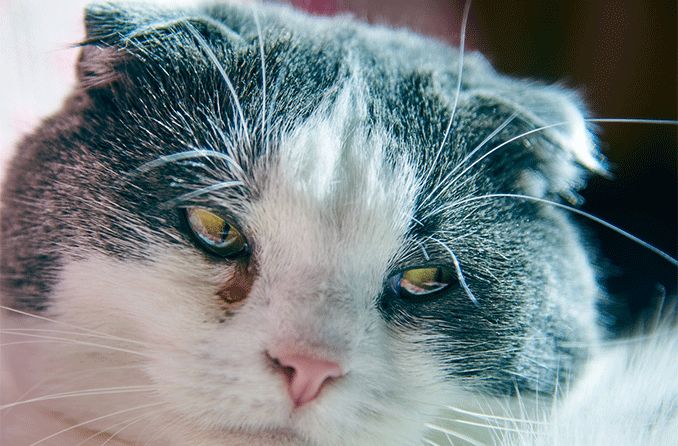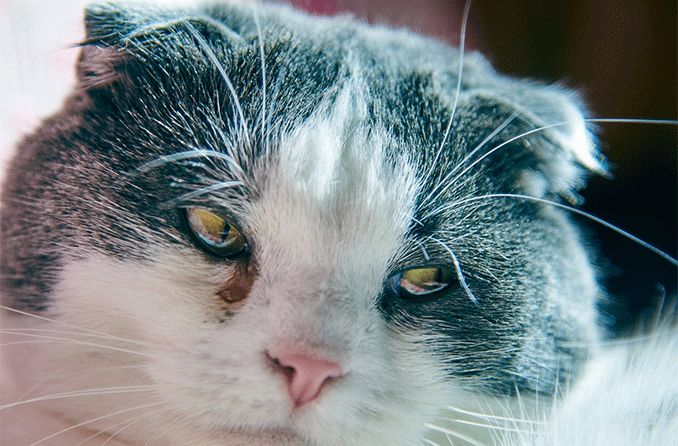If you’re a cat lover, you’ve probably encountered a common yet concerning issue: your feline friend has a watery eye! At first, it might seem like a minor annoyance, but trust us, it’s not something to be taken lightly. In fact, excessive tearing can be a sign of underlying health issues that need attention.
A Common Problem, A Serious Concern
Cats are notorious for their independence and stoicism, but when they start showing signs of discomfort or distress, it’s our job as pet parents to take notice. Excessive tearing is one such sign, and in this post, we’ll delve into the world of watery eyes in cats, exploring what causes it, how to identify it, and most importantly, what you can do about it.
What Causes Watery Eyes in Cats?
Before we dive deeper, let’s start with the basics. There are several reasons why your cat might be experiencing watery eyes. One of the most common causes is foreign matter or debris getting into their eye. This could be anything from dust and dirt to hair and even tiny insects! When this happens, the natural response is for the eye to tear up in an attempt to flush out the offending substance.

If you’re a cat lover, you’ve probably encountered a common yet concerning issue: your feline friend has a watery eye! At first, it might seem like a minor annoyance, but trust us, it’s not something to be taken lightly. In fact, excessive tearing can be a sign of underlying health issues that need attention.
A Common Problem, A Serious Concern
Cats are notorious for their independence and stoicism, but when they start showing signs of discomfort or distress, it’s our job as pet parents to take notice. Excessive tearing is one such sign, and in this post, we’ll delve into the world of watery eyes in cats, exploring what causes it, how to identify it, and most importantly, what you can do about it.
What Causes Watery Eyes in Cats?
Before we dive deeper, let’s start with the basics. There are several reasons why your cat might be experiencing watery eyes. One of the most common causes is foreign matter or debris getting into their eye. This could be anything from dust and dirt to hair and even tiny insects! When this happens, the natural response is for the eye to tear up in an attempt to flush out the offending substance.
Another possible cause of watery eyes in cats is conjunctivitis, a common eye infection that can be caused by bacteria or viruses. This inflammation of the conjunctiva can lead to excessive tearing, redness, and discharge. According to the American Animal Hospital Association (AAHA), conjunctivitis is one of the most common eye problems in cats.
In some cases, watery eyes in cats may also be a sign of more serious health issues, such as upper respiratory infections or even dental problems. For instance, a toothache can cause your cat to tear up excessively due to the pain and discomfort it’s experiencing.
How to Identify Watery Eyes in Cats
If you’re concerned about your cat’s watery eyes, there are a few things to look out for. Firstly, check if the tearing is excessive or persistent – if it is, it could be a sign of an underlying issue. You should also look for other signs of discomfort or distress, such as rubbing their eyes or avoiding light.
It’s also important to inspect your cat’s eyes closely, looking for any redness, discharge, or swelling. If you notice any of these symptoms, it’s essential to consult with a veterinarian to rule out any underlying health issues.
What Can You Do About Watery Eyes in Cats?
So, what can you do if your cat has watery eyes? Firstly, try to identify and remove any foreign matter or debris that may be causing the issue. If the tearing persists, it’s always best to consult with a veterinarian who can perform a thorough examination and provide a proper diagnosis.
In some cases, your vet may prescribe antibiotics or anti-inflammatory medication to treat conjunctivitis or other underlying health issues. They may also recommend cleaning the eye gently with a sterile solution to remove any discharge or debris.
By taking prompt action and addressing the underlying cause of your cat’s watery eyes, you can help alleviate their discomfort and prevent any potential complications from arising.
Get Expert Advice on Your Cat’s Watery Eye
Our medical and health experts are here to help you understand and address your cat’s condition.
Consult a Medical ExpertTo summarize, we’ve covered the importance of recognizing excessive tearing in cats as a potential sign of underlying health issues. We’ve also explored some common causes of watery eyes in felines, including foreign matter or debris getting into their eye.
What Can You Do About Your Cat’s Watery Eyes?
So, what can you do to help your cat feel more comfortable and address the issue of watery eyes? First and foremost, it’s essential to consult with a veterinarian to rule out any underlying health issues that may be contributing to the excessive tearing. In many cases, the issue is simply a matter of removing the foreign debris or cleaning the eye. Your vet can provide guidance on how to do this safely and effectively.
Preventing Watery Eyes in Cats
While we’ve covered what causes watery eyes in cats, it’s also important to think about prevention. Here are a few simple steps you can take to help reduce the likelihood of your cat experiencing excessive tearing:
- Keep your home clean and dust-free to minimize the amount of foreign matter that can get into your cat’s eye.
- Use a humidifier in your home to keep the air moist, which can help reduce tear production.
- Consider using artificial tears or other eye drops specifically designed for cats to help lubricate and soothe their eyes.
The Takeaway
In conclusion, watery eyes in cats are more than just a minor annoyance. They can be a sign of underlying health issues that need attention. By understanding what causes excessive tearing and taking simple steps to prevent it, you can help keep your cat happy and healthy. Remember, if you’re ever concerned about your cat’s eye health or the amount of tearing they’re experiencing, always consult with a veterinarian for professional guidance.
Can albuterol be used on dogs: Are you considering using albuterol on your canine companion? Find out if this medication is safe and effective for dogs, and what you need to know before administering it.
Red bumps on head of penis: Have you noticed strange red bumps on the head of your penis? Learn about possible causes and treatment options for this condition, and how to regain confidence in your own skin.



